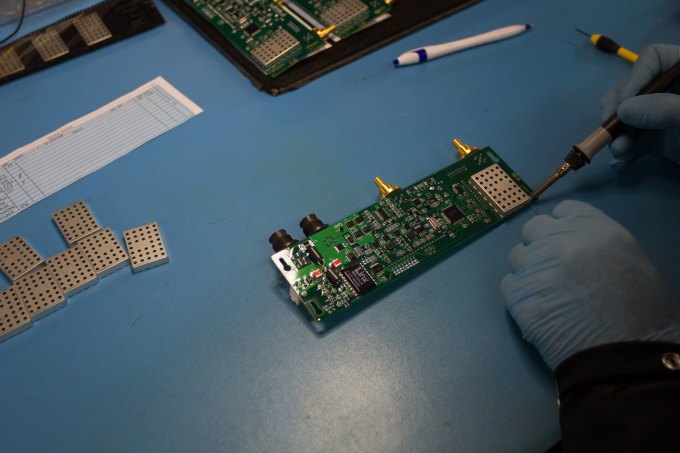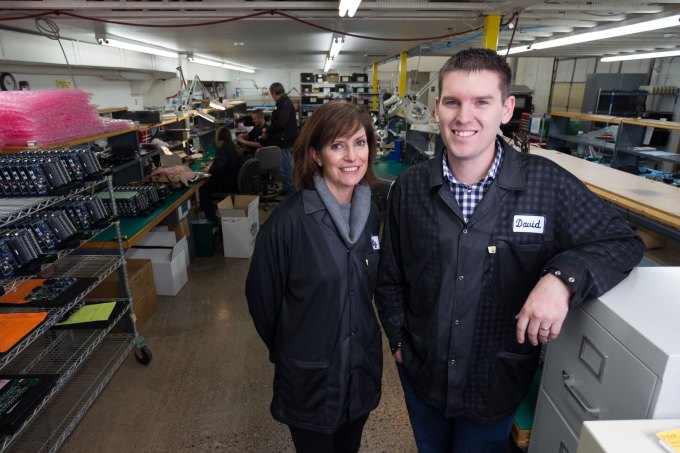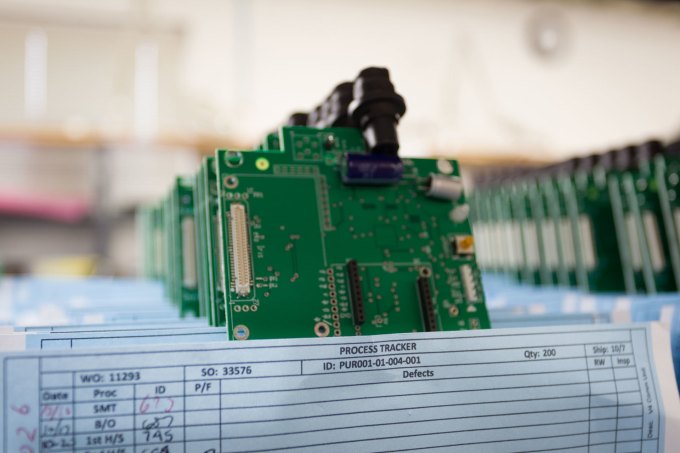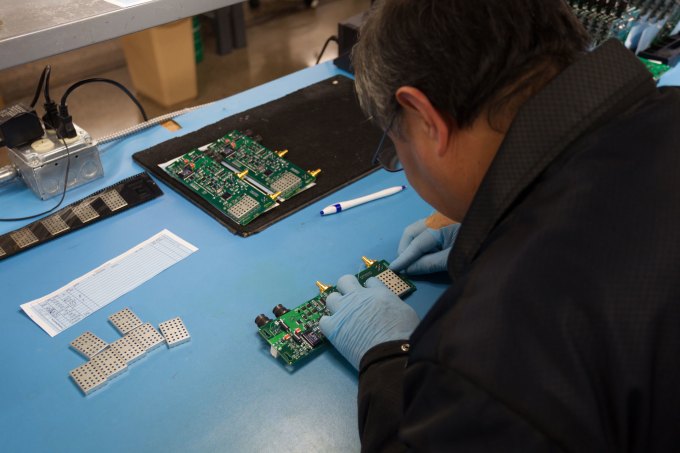Fara Warner
Editor’s Note: Fara Warner is the editorial director for This Built America and Aol Tech, which includes TechCrunch and Engadget. She has worked for the Wall Street Journal and Fast Company and was the 2007-2009 Howard R. Marsh Visiting Professor of Journalism at the University of Michigan.
Corvallis, Oregon seems an unlikely high-tech town. Once a center for logging, small produce farms that now grow mint and fescue grass surround the university town of about 55,000 people.
But in the 1970s, Hewlett-Packard built a massive plant on the outskirts of Corvallis, bringing with it a wave of technology talent. In those early years, the factory assembled handheld calculators, HP’s first personal computers and eventually became known for perfecting ink jet printing.
As HP’s business shifted over the decades, some of its scientists and engineers left to start their own businesses in Corvallis, creating a base of manufacturing and technical businesses. In addition, Oregon State University helped to supply an educated workforce that allowed Corvallis to compete against the larger metropolitan areas of Portland to the north and Eugene to the south.
One of those companies was RelianceCM, a contract manufacturing company that for the better part of two decades operated under the name MegaTech. During the 1990s, the company ran three shifts as a “board stuffer,” cranking out thousands of circuit boards mostly for the telecommunications industry.

Circuit boards, now a multi-billion dollar global industry, are both the brains and brawn of virtually all the technology products we use. They are most often made from copper boards upon which wire circuits are soldered, connecting the dots to resistors and capacitors that make technology work. The computer, phone or handheld device you’re reading this on works because of circuit boards.
By 2013, RelianceCM’s biggest telecomm customer shifted its circuit board manufacturing to China. But instead of closing up shop, the company saw an opportunity in the now-booming hardware start-up world where entrepreneurs needed small batches of circuit boards to test their ideas and start small-scale manufacturing.
That’s when David Schroeder, the now 28-year-old son of the company’s third owner Scott Schroeder, decided to do what most companies consider unthinkable: throw away 25 years of history and get rid of the MegaTech brand name.
Scott wasn’t in love with the old name, “but I thought he was crazy,” the elder Schroeder remembers thinking when David told him they needed to change it. Still he took the leap of faith and said yes to a new name.
The name, RelianceCM, focuses attention on the company’s ability to provide hardware startups with hands-on help, reliable circuit boards and a sustainable supply chain. Still it wasn’t easy giving up on the name, even one like MegaTech. “It was a scary process,” David says. “We didn’t just shorten the name. It was gone. Flushed outside of the system. We don’t use it anymore.”
The Odd Couple

David never expected to join his father’s business, let alone overhaul its image for hardware startups. He graduated with a marketing degree from Oregon State with every intention of doing something that probably didn’t involve MegaTech.
But it was 2008 and the country was sliding precipitously into the Great Recession. “I never pictured myself here,” David says of the company’s non-descript office and manufacturing space in a small industrial park a few minutes’ drive from the city’s picturesque downtown. “But it’s what I knew.”
Unlike past generations of children who joined the family business and stayed the course, David didn’t want to just fill his father’s shoes. He wanted to create his own path. But first, his dad put him to work on the factory floor, learning the process of creating circuit boards with people who have worked on the small and often delicate products for more than a decade.
That gave him hands-on experience, so that when he stepped into the role of business development manager a couple of years later, “he knew what he is talking about,” Scott says of courting prospective clients.
Around the same time David joined the company, Patty Baker came on as the company’s office manager. She too was looking for a way through the recession and, like David, she wasn’t content with how the company was selling itself to the outside world. Nor did she want to be an office manager for the rest of her career.
The recession, however, made it tough to risk much at the small company. But when Monaco, a client who made recreational vehicles went bankrupt, Patty and David saw a business that might help them get through the tough economic climate. They decided to continue sourcing those parts from other suppliers, essentially acting as a parts supplier, and help get those products directly to consumers. The risk paid off. “It got us through the deepest part of the recession,” Scott says.
Because of this success, Scott says it was obvious that Patty was the perfect candidate to replace the company’s sales manager when he retired. Patty chose the title of relationship manager when the company shifted its focus as it rebranded itself RelianceCM.
Patty, 48, jokes that when they walk in to sell the company’s abilities to new customers she knows they are thinking who are “the middle-aged lady and the kid?”
But the odd couple combination has worked. David often starts out taking the technical questions and Patty connects with people over topics outside of even contract manufacturing. But the conversations don’t always end that way. “A person I would expect D (her nickname for David) to get on with ends up talking to me and vice versa.”
Patty says traveling and meeting clients together helped her and David come to the decision that RelianceCM needed to be a company that entrepreneurs would have confidence in. They wanted their company to be able to meet the start-up mentality—a business model that requires fast and flexible manufacturing.
“Who do we want to talk to as customers and at that point we were talking to a lot more startups—which we had always called them ‘new customers’—but these people had a new mindset,” she says. “They weren’t just the engineers that we had been trying to present to. They were entrepreneurs with a broader vision.”
Hardware is Cool…Again

For many people, even those hardware entrepreneurs, contract manufacturing is a bit of a mystery. But as David puts it simply, “we are building other people’s products. When it comes down to putting whatever widget it is together, we are the people who screw it together, place the parts on the board and ship a product out of here.”
Over the decades, that type of manufacturing has been shipped overseas because building circuit boards can be extremely labor intensive. But for start-ups who only need a few boards to test, or a few thousand to put in their products to sell, going to Asia can be daunting. Even at scale, navigating the world of contract manufacturing overseas isn’t easy.
They have taken this industry that has operated in one way for twenty, thirty years –probably more — and kind of turned it upside down. David Schroeder
Those two factors have collided as hardware has become cool again. There are companies that need to test their ideas in the real world, but few places domestically can build the circuit boards. David says when he tells people in the San Francisco area that he is in contract manufacturing they think he has a factory in China. It takes them a while to understand that RelianceCM actually make boards in America.
Companies like Dragon Innovation have helped hardware startups Pebble and Sifteo manufacture overseas. But not every company needs hundreds of thousands of parts. Some never will and not everyone wants to head to China. That’s where RelianceCM hopes to fill a vacuum, especially the domestic one.
“We can compete if the labor component remains small compared to the parts cost,” Scott says. “We can work with early stage companies that need high touch and grow with them.” Part of Scott’s strategy also has been to invest in some early-stage companies as well. David, for his part, spends a good amount of time in Portland, where he organizes and helps run the monthly PDX Hardware Startup meetup.
 Contract manufacturing—no matter how hot hardware startups are right now—remains one of the less sexy sides of what is now called “the Internet of things,” which seeks to combine hardware with software and sensors to link all kinds of machines together via the Internet.
Contract manufacturing—no matter how hot hardware startups are right now—remains one of the less sexy sides of what is now called “the Internet of things,” which seeks to combine hardware with software and sensors to link all kinds of machines together via the Internet.
But without RelianceCM, companies like VendScreen probably wouldn’t be upending industries like the vending machine business.
VendScreen may not seem all that cool against flashy hardware products like smart watches or drones. But the company is a great example of why a company like RelianceCM is an important link in the Internet-connected hardware space.
Most vending machines are still deeply embedded in the analog machine world. Many still only take coins or cash and are restocked on routes that may have little to do with whether a machine is out of chips and soda.
VendScreen wants to change that. Its technology essentially is an Android retrofit that turns a vending machine into a big data machine—and it takes credit cards. The small plastic device RelianceCM makes is literally crammed with seven circuit boards. That stack gives the vending machine the capability of sending data on what’s selling and what’s not, nutritional data and pretty much anything else those seven boards can deliver.
All that is put together in a small manufacturing space across a parking lot from RelianceCM’s main building. Some devices are half built, the circuitry exposed, others are “talking” to VendScreen’s servers and still others are packed and ready to ship out.
“They have taken this industry that has operated in one way for twenty, thirty years — probably more — and kind of turned it upside down,” David says.
He could say the same for his own company that is proving contract manufacturing for start-ups can happen in a small town in Central Oregon.































Comment